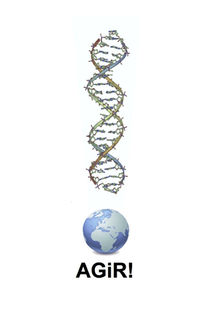Micronuclei and Mercury
Genomic integrity is a new 'big picture' concept to aid public health efforts and basically includes all the molecular genetic details of cells!
So many things we commonly choose to do can impact genomic integrity, also potentially affecting future generations!
Pollution that we can rarely choose to avoid is a key problem affecting genomic integrity, that sometimes cannot be avoided by local populations. For instance, mercury, like that which pollutes many areas where gold mining is pursued (legally or illegally).
One way to measure effects of mercury pollution in cells is the micronucleus assay, which Hackuarium is making 'open-source' for anyone interested.
Introduction
After a visit to the site of the old Hackuarium in November 2018 by members of MáS ARTE MáS ACCIóN, Rachel was invited by Fernando and Alejandra to join in co-constructing a project with a group of Swiss artists sponsored by ProHelvetia.
Concern about a mercury-empoisoned river, people in its vicinity and hoping to reach people in creative way, the current Hackuarium president, Rachel, jumped at the chance. Perhaps genomic integrity could be protected in the long run with some action...
Perhaps micronuclei workshops will be run with many kids from 3 locations during the next visit?
Context
In Colombia
In Switzerland
People
Fernando Alejandra Andrés Ox Jonathan Steve? (bogota researcher) Mabel (quibdo`researcher) Bella Yuli Camilo more!!
Main Goals
make the world a better place
Objectives
perhaps help provide evidence that 'bio-gold' is every bit as valuable as bio-foodstuffs!
we wonder if this magnificent woman would be our image for this campaign??
Background & Inspiration
Protocol (Plan)
Setup description
Needs for workshop
The most important point of this wiki page in Hackuarium, is to define the needs and consumables for the simplest micronucleus assay, for 20 participants.
We can do this workshop for any age from 9 to 99, and hope you will want to try!
For 20 participants making 2 slides each, the basic needs for the workshop include:
- 20 toothbrushes (always ask people to bring their own, as they say it takes 1000 years for a plastic toothbrush to degrade, and to make sure they are cleaned, as pelleting toothpaste residue with the cells is disappointing!)
- Saline solution (at least 200ml - can make with NaCl or get physiological solution at pharmacy)
- 20 small glasses - to put 10ml into each, for washing off the collected cells
- microcentrifuge - to pellet cells, this can be anything from a 'close and play' version, to real lab ware, and there is even a cute diy centrifuge that can be made out of an old hard drive, for a really fun extra part of workshops... (to add links)
- 40 microcentrifuge tubes - two for each participant, to 'harvest' their cells
- 20 transfer pipettes - to put the cells in saline into the centrifuge tubes
- liquid waste containers (x4 is convenient - just glass cups work fine, saline can just go down the drain, but for meblue waste, I prefer running it over an activated charcoal filter, to avoid putting the dye down the drain - then want a funnel and activated charcoal powder too)
- one box microscope slides (x50)
- optional heating plate - to dry down cell 'smears' onto slides efficiently
- lighter or other flaming device - to fix cells to the glass slide (flame around 3 seconds from below)
- wooden pinchers or strong forceps - to hold slide while fixing cells with flame
- Methanol:Acetic Acid Solution (about 20ml of a 3:1 mix, i.e. 15ml methanol + 5ml of glacial acetic acid) - this is listed as an optional fix in our standard protocol, but makes the stained cells look much nicer for scoring, so is generally recommended...
- 0.5% methylene blue dye in Ethanol (0.5g in 100ml) - to stain the cell nuclei (and micronuclei) blue
- 75% ethanol - to destain cells
- microscopes for scoring (at least 100-400x magnification is best, and being able to take pictures very useful - even cell phones through the objective can work, but many other options exist, diy too! -to add links...)
Recommendations + next steps
a complete protocol is already in this wiki. try it out, and tell us how it works for you!
